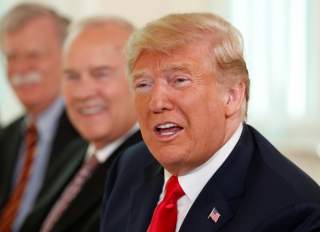Interview With Richard Burt: The Dangers of Withdrawing from the INF Treaty
“We’re potentially just a short distance from a major mistake.”
Heilbrunn: President Trump essentially said a few days ago "bring it on." We can build as many nuclear weapons as we want until everyone else sees that we can pull this off and they’ll have to capitulate and come to the table. Is that realistic?
Burt: No, it isn’t. It isn’t realistic because we do have a large economy—probably still larger than that of China’s—but we have a number of military responsibilities, and we’re living in an economy where Trump doesn’t want to reduce spending for entitlement programs. His political base isn’t going to put up with ending Medicare or Social Security or substantially cutting back on them. He has promised and legislated a tax reform plan which has already led to substantial increases in the U.S. deficit. So warning of a new arms race as a way of achieving arms control strikes me as a very facile and phony threat.
Heilbrunn: Do you believe withdrawal from the INF Treaty will be seen as a turning point in America’s foreign-policy fortunes? Or just another step on a road to an uncertain future?
Burt: It is a serious mistake. And it is going to be important to pay close attention to not only how the Russians react but more importantly the Europeans.
Heilbrunn: Well both the Germans and Japanese are very allergic to this move, and they're already signaling that.
Burt: Well, Trump either consciously or unconsciously seems to have declared war on Germany. The Germans don’t have the advantage of having their own small nuclear deterrent as does Britain and France; it is more dependent on the U.S. nuclear guarantee than they are. And Germany finds itself attacked by this administration in terms of trade policies, in terms of its defense spending, in terms of its purchases of energy from Russia, and now with the INF treaty. The real question is: has the fundamental foundation of German security policy been undermined? This should trigger a real crisis of Germany thinking about their security options. Now it is interesting to think about how they’ll react. Will they look to the European Union and the embryonic efforts there to build a kind of European defense and security pillar? Will they look to create a new, closer relationship with the Russians which has always been a kind of romantic dream of the German left? Will they try to establish themselves—as current German public opinion would like to do—to try and identify themselves as just a bigger version of Switzerland. That, in my view, is unsustainable. They will have to make a choice.
Heilbrunn: There’s another option though. Part of the political spectrum of the country is moving to the right.
Burt: Correct.
Heilbrunn: And part of it is moving to the left.
Burt: Correct. You are beginning to see some of the same kind of polarization you’ve seen in other parts of Europe and the United States.
Heilbrunn: There’s talk of building a German atomic bomb.
Burt: I know there is. And I’ve spoken to some people who are at least participating, or beginning to participate in that debate. I don't think it would be a truly independent German deterrent. The Germans would seek to somehow multi-lateralize that capability.
Heilbrunn: With the French.
Burt: Maybe with the French. The British as well. The Germans do have nuclear weapons on their territory and nuclear-capable aircraft. They operate as members of the NATO nuclear planning group. So the Germans in some ways, while not an independent nuclear power, are part of the NATO nuclear structure. But since NATO is an American operation, that will not be viewed, in my judgment, as sufficient going forward. There will have to be a European umbrella of some sort to give the Germans greater confidence in their security and the future.
Heilbrunn: So the final question would be: is President Trump reacting to shifts in world politics that were already occurring and accelerating them? Or is he willfully hurling us into an unnecessarily dark future?
Burt: I would like to believe that President Trump, together with his senior advisers, have a plan, a strategy that they are moving towards. And I would like that strategy to be explained so that people can understand it and debate it. But I don’t think that strategy exists. I don't think there is a strategy here and that’s what makes the current situation all the more dangerous and difficult.
I think the INF decision was taken in an impetuous way—it wasn't thought through and, as a result, you can’t really explain it in any coherent way. I think that's true for most of Trump’s foreign policy—it’s partially unilateralist, but it's also partially emotional, and it’s partially visceral. And without a framework, without a fleshed-out policy, it’s highly unpredictable and, as a result, it reduces our influence on the world stage, and we're potentially just a short distance away from a major mistake.
Heilbrunn: Thank you for the interview.
Richard Burt is chairman of the National Interest’s Advisory Council and a former U.S. ambassador to Germany and assistant secretary of state for European and Canadian affairs. Jacob Heilbrunn is editor of the National Interest.
Image: Reuters

